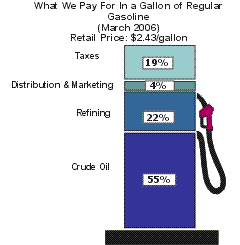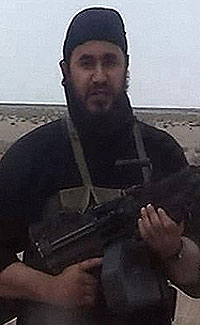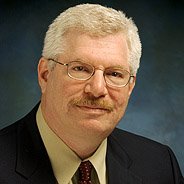 Image Credit: Department of Energy via World Net Daily
Image Credit: Department of Energy via World Net DailyFor all of the promise of having a viable replacement for petroleum based fuel; there are still problems that could lead to a quick fix to our dependency on Muslim based product resources.
The problems may not be that easy to solve just because the cost of petrofuel raises to wipe away the costs of implementation involved with Ethanol production.
Excerpts from WorldNetDaily -
Will $3 gasoline be enough?
By Henery Lamb - Posted: April 29, 20061:00 a.m. Eastern
A $60 fill-up is certainly enough to get fingers of blame pointing in every direction: Democrats blame Bush; pundits blame "Big Oil"; and consumers blame the powers that be. The real cause of the ridiculously high gasoline prices is generally ignored.
The underlying cause, of course, is the incontrovertible fact that demand has outstripped supply. There's plenty of oil in the world; the problem is that the available oil cannot be extracted and refined into usable gasoline in sufficient quantities to meet the world's demand.
Why? Thirty years of environmental advocacy has produced a majority in the United States who would rather pay $3 per gallon, and even more, than to allow oil to be extracted from the frozen tundra of Alaska, or from the Gulf, or from any other place.
Not a single refinery has been built in the U.S. in 30 years. Arizona Clean Fuels has been trying since 1989 to build a new refinery east of Phoenix. Having finally gotten an initial permit, environmental organizations are gearing up their opposition.
Extremely high gasoline and energy costs are the price society must pay for the environmental protection it has demanded.
Ethanol is not the answer. Increased use of ethanol will help, but it can never replace oil as the primary transportation fuel. An acre of corn produces 160.4 bushels, from which 57.3 gallons of ethanol can be made. Used as E85 (85 percent ethanol, 15 percent gasoline), an acre of land would produce the equivalent of 67.4 gallons of gasoline. The daily gasoline consumption in the U.S. is 320,500,000 gallons.
The entire 73.6 million acres of corn harvested in 2004 would supply only 15.5 days of gasoline replacement. There simply is not enough land available to produce enough corn or other crops for ethanol to make a significant dent in gasoline demand. Moreover, current environmental policy encourages taking agricultural land out of production, not expanding production.
--
Federal and state taxes take more than twice the amount retained as profits by the oil companies. Many local communities impose additional taxes. Politicians are not calling for the repeal of these taxes.
Regulatory costs are more difficult to identify. The EPA requires dozens of different gasoline formulations for different parts of the country, and these formulations change with the seasons. These changes are cost-intensive and add to the price at the pump. Clean air regulations at the refinery and other environmental regulations at every step of the production process also add to the price at the pump. These are the requirements society has demanded, and they must be paid by the consumer.
The greatest pressure on price is the burgeoning demand from China and India, and the growing dependence in the U.S. upon foreign oil. As a percentage of total consumption, domestic production has declined steadily for 30 years and currently accounts for only 40 percent.
--
The price at the pump will continue to rise until it reaches a point that forces a realistic assessment of the value of affordable transportation, compared to the value of keeping frozen tundra, wastelands and oceans free from oil production.
--
Three dollars per gallon may not be enough. But it is getting close.
Read All>>
Of course, there is always Hybrid technology. The cars, however, are around 30K and the batteries need to be replaced every 4 to 7 years, depending on who one listens to, at an additional cost that can approach 15% of the original cost of the vehicle. Then there is the problem of battery disposal when a major automobile population is hybrid based.
It is time to get away from the geopolitical resources that power our economy and the sooner the better ... not due to the cost per gallon argument, but because of the issue referred to as "WARFOOTING".
At MAXINE, we believe it is time to adopt environmental policies that also help to promote self preservation; a balance has to be achieved.











